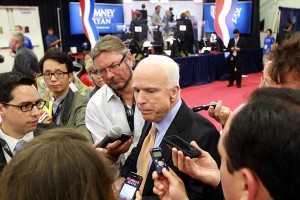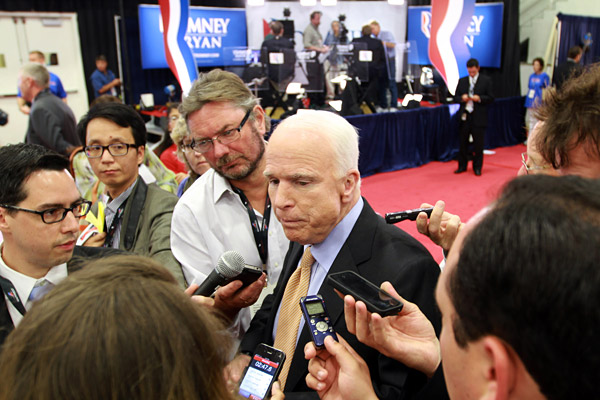
By David Lightman and Lesley Clark, McClatchy Newspapers –
BOCA RATON, Fla. — The merits of diplomacy and brinkmanship in Libya, China, Iran, the Middle East and other volatile areas were expected to be front and center Monday as President Barack Obama and Republican Mitt Romney met in their final debate.
The topic of the 90-minute clash at Lynn University was foreign policy, which polls show is not a major concern of most Americans as they prepare to vote Nov. 6. But the debate could give voters a measure of how each candidate would act as commander in chief.
Obama was expected to cite what he termed successes of his administration — the 2011 killing of Osama bin Laden, the overthrow of Moammar Gadhafi in Libya, and the end of American military involvement in Iraq and Afghanistan.
Romney has said that the administration has failed to offer the world an image of strength. Iran, he has said, remains a serious threat and the killing of four Americans in Libya on Sept. 11 suggests the U.S. is not prepared enough to fight terrorism.
Romney and Obama entered the debate in a virtual tie in most national polls. Romney gained momentum from the first debate Oct. 3, thanks to Obama’s listless performance. The president rebounded in their Oct. 16 meeting, but some surveys suggest the lesser-known Romney has more potential to gain.
Some of the likely topics at Monday’s debate:
—Libya: The unrest in the North African nation and the killing of the U.S. ambassador and three other Americans during an attack on the U.S. consulate in Benghazi has dogged the administration for more than a month.
Romney has seized on Libya’s instability to argue that Obama’s Middle East policies have failed and left the United States more vulnerable to attacks. Romney has employed the administration’s changing explanations of what happened during the attack to portray the administration as weak and vacillating.
But Romney has struggled to present a strong position of his own, prompting a nearly bipartisan round of criticism for appearing rash, and presumably non-presidential, when he hastily issued a scathing condemnation of the administration’s initial response to protests in the Middle East before all the details were known.
In last week’s debate, Romney focused on whether Obama had used the word “terrorism” to characterize the attacks, but his line of criticism ran aground when moderator Candy Crowley agreed that Obama had used the word “terror” in an address the day after the attacks.
Republicans also have accused the administration of failing to provide adequate security at the facility, though Democrats have countered that Republicans voted to cut the State Department’s budget.
—Iran: Aside from putting greater stress on threatening military action, Romney hasn’t articulated a plan for dealing with Iran’s nuclear program that’s much different from Obama’s approach. That policy combines tightening sanctions and keeping a military option open while pushing for a diplomatic deal under which Iran would halt its enrichment of uranium.
The deal also would involve Iran disclosing details of an alleged warhead development effort that U.S. intelligence says stopped in 2003. Iran has denied that it is trying to develop nuclear weapons.
While there have been U.S. sanctions on Iran for decades, Obama succeeded in winning Chinese and Russian support for additional U.N. measures and has coordinated a growing menu of harsher measures with the European Union. The combined steps, the toughest sanctions ever imposed on Iran, have severely slashed Iran’s oil export earnings, made it harder for Tehran to import nuclear-related materials, reduced the Iranian central bank’s access to hard cash and helped plunge the value of the rial by 80 percent in the last 10 months.
Iran has continued to expand its uranium enrichment program in defiance of U.N. resolutions. But Iranian leaders have in recent weeks called for the United States, the European Union, Russia and China to resume stalled negotiations on a diplomatic deal, and a new round is expect late next month.
—Iraq and Afghanistan: Romney has echoed Obama’s goal of withdrawing combat troops from Afghanistan by the end of 2014, but he said he’d let military commanders determine the pace. And Republicans have criticized Obama for failing to secure an agreement with Iraqi leaders to keep some peacekeeping forces in that country.
Romney has charged that the troop withdrawals were “based upon electoral expediency, not military requirement,” though polls have shown that most Americans support the move. Additionally, the American troop withdrawals from Iraq were required under a timetable negotiated by the Bush administration before Obama took office.









